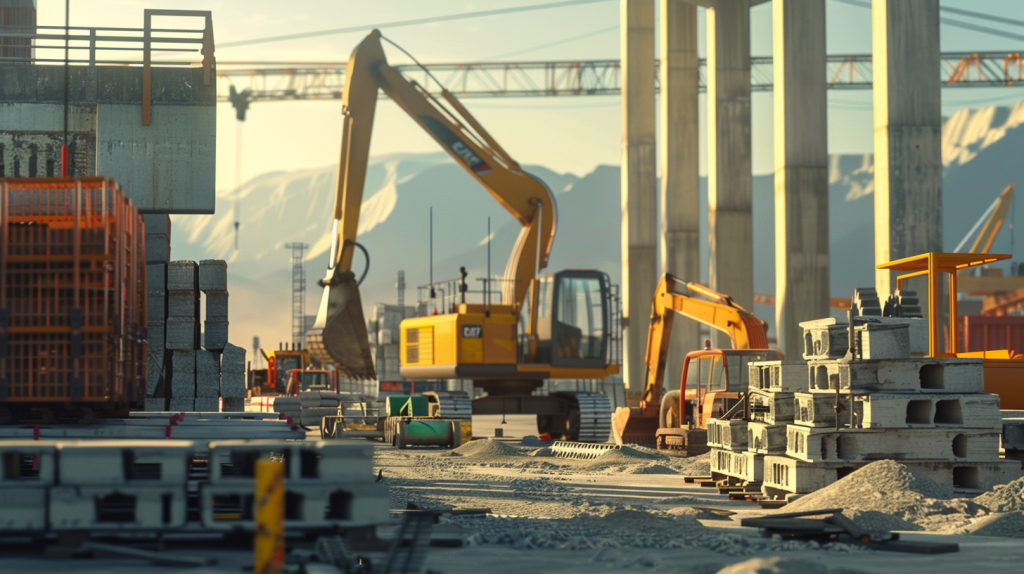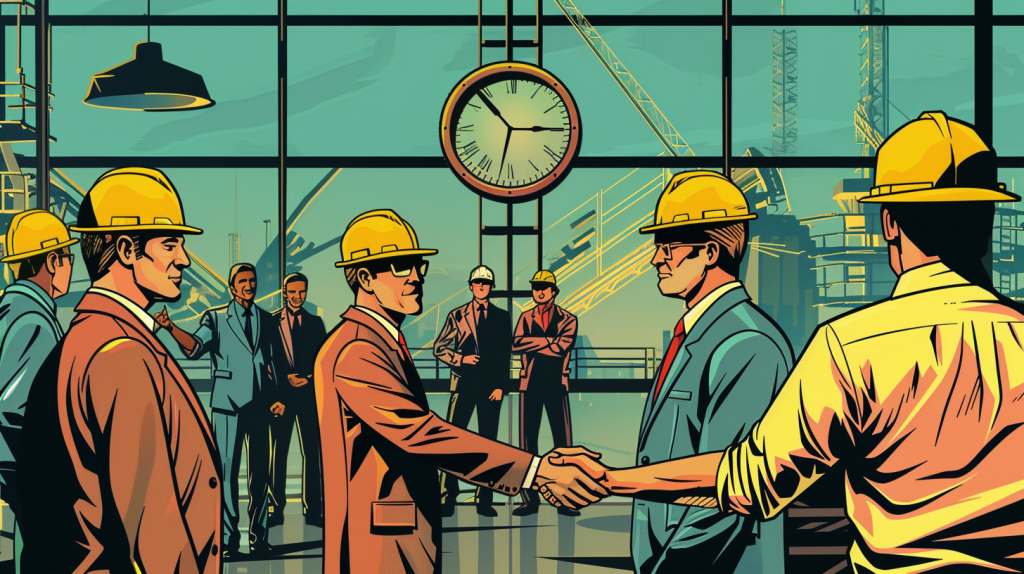Top 10 Benefits of Leveraging Advanced Construction Delivery and Materials Management Systems
Table of Contents:
In today’s fast-paced construction industry, the difference between a successful project and a missed opportunity often lies in the details of project management, particularly in how materials are delivered and managed. The advent of advanced delivery and materials management systems has been a game-changer, offering unparalleled efficiency and strategic advantages. This innovative approach is not just about keeping projects on schedule and within budget; it’s about redefining what’s possible in the realm of construction, turning challenges into opportunities, and setting new benchmarks for success.

The essence of these systems lies in their ability to streamline operations, ensuring that every aspect of material management is optimized – from procurement and storage to allocation and usage. This not only simplifies complex logistics but also enhances the overall performance of construction projects. Imagine a construction landscape where delays due to material shortages or excess inventory costs are things of the past. That’s the promise of advanced delivery and materials management systems, offering a seamless, integrated approach that keeps projects moving smoothly and efficiently.
But the benefits don’t stop there. In an era where sustainability and environmental responsibility are not just buzzwords but imperatives, these systems offer a pathway to greener construction practices. By minimizing waste and optimizing resource use, they contribute to more sustainable project outcomes, aligning with global efforts to reduce the construction industry’s environmental footprint. This is not only good for the planet but also resonates with clients and consumers increasingly seeking eco-friendly construction solutions.
Moreover, the transparency and accountability provided by these systems foster stronger collaborations among all stakeholders. From suppliers to contractors, everyone has access to real-time data, ensuring that decisions are informed, timely, and aligned with the project’s goals. This collaborative environment not only smoothens the workflow but also builds trust, a critical component in any construction project’s success.
As we delve into the top 10 benefits of leveraging advanced delivery and materials management systems, it’s clear that we’re looking at a transformative approach that goes beyond mere logistics. It’s about building smarter, working more sustainably, and achieving outcomes that were once thought impossible. This is not just evolution; it’s a revolution in construction management, promising not only to meet the demands of the present but also to pave the way for a more efficient, sustainable, and successful future in construction. Let’s explore how embracing these advanced systems can catapult your projects to new heights, ensuring that you stay ahead in the competitive and ever-changing construction industry.
Top 10 benefits of leveraging advanced delivery and materials management systems
1. Enhanced Efficiency and Productivity
The integration of advanced delivery and materials management systems marks a significant leap in construction efficiency and productivity. By optimizing the supply chain, these systems ensure that materials are delivered on time and allocated efficiently, reducing idle time for workers and machinery. This streamlined process allows for a smoother flow of operations, cutting down on project timelines and significantly boosting productivity. Moreover, the precision in scheduling and inventory management minimizes the risk of overstocking or understocking, ensuring that resources are utilized effectively. This not only accelerates project completion rates but also creates a more dynamic and responsive construction environment, where every minute and material counts.
2. Cost Savings
One of the most tangible benefits of advanced delivery and materials management is the substantial cost savings it offers. By reducing waste through precise ordering and minimizing the need for last-minute purchases at premium prices, projects can see a considerable decrease in material costs. Additionally, the efficiency gained in project timelines reduces labor costs and overheads, as projects are completed faster and more efficiently. These savings can then be allocated to other areas of the project or passed on to clients, making competitive pricing a reality. In the long run, the initial investment in these advanced systems pays off, leading to more profitable projects and a healthier bottom line.
3. Reduced Environmental Impact
Sustainability is a pressing concern in today’s construction industry, and advanced delivery and materials management systems play a pivotal role in addressing this issue. By optimizing material usage and reducing waste, these systems significantly lower the environmental footprint of construction projects. Furthermore, the ability to plan and execute more efficient transportation routes for deliveries not only reduces emissions but also decreases the overall energy consumption associated with material logistics. This commitment to eco-friendly practices not only helps companies meet regulatory requirements but also resonates with a growing demographic of environmentally conscious clients and communities.
4. Improved Quality Control
Quality control is paramount in construction, and advanced delivery and materials management systems enhance this aspect by ensuring that the right materials are available at the right time and in the right condition. By monitoring the quality of materials from the point of order to delivery and use, these systems help avoid the use of substandard materials that could affect the integrity of the project. Additionally, the real-time tracking of materials allows for immediate rectification of any issues, ensuring that the highest quality standards are maintained throughout the construction process. This relentless focus on quality not only safeguards the project’s outcome but also enhances the reputation of the construction firm.

StruxHub
Discover how StruxHub can revolutionize your construction management. Contact us today!
5. Increased Transparency and Accountability
Advanced delivery and materials management systems offer unparalleled transparency and accountability in the construction process. Stakeholders have real-time access to information regarding material orders, deliveries, and usage, allowing for a clear overview of the project’s progress and resource allocation. This transparency fosters trust among clients, contractors, and suppliers, ensuring that everyone is aligned with the project’s objectives and timelines. Moreover, the accountability it brings helps in identifying inefficiencies and areas for improvement, driving continuous optimization of processes and resources.
6. Enhanced Risk Management
The construction industry is fraught with uncertainties, but advanced delivery and materials management systems help mitigate these risks. By providing detailed forecasting and real-time visibility into the supply chain, these systems enable project managers to anticipate potential issues and make informed decisions to avoid them. Whether it’s delays in material delivery or shortages of critical resources, having a proactive approach to risk management ensures that projects stay on track, within budget, and meet their quality standards. This not only protects the project timeline but also minimizes financial exposure and reputational risk.
7. Better Supplier and Vendor Relationships
The efficiency and reliability brought by advanced delivery and materials management systems extend beyond the construction site, fostering stronger relationships with suppliers and vendors. With clear communication and expectations, suppliers can better plan their inventory and logistics, leading to more reliable service and potentially better terms. These positive relationships are crucial for securing favorable pricing, ensuring quality materials, and guaranteeing timely deliveries, all of which contribute to the smooth execution of construction projects.
8. Scalability and Flexibility
As construction companies grow, their projects and operations become more complex. Advanced delivery and materials management systems offer the scalability and flexibility needed to manage this increased complexity without compromising efficiency or control. These systems can easily adapt to the changing scale and scope of projects, allowing companies to take on more ambitious projects or expand into new markets with confidence. Moreover, the flexibility to adjust to unforeseen changes in project timelines, material availability, or client requirements ensures that the company can maintain its competitive edge in a dynamic industry.
9. Improved Safety
Safety on the construction site is significantly enhanced by the implementation of advanced delivery and materials management systems. By ensuring that materials are not only delivered on time but also stored and handled correctly, these systems reduce the risk of accidents and injuries. Proper material management helps in maintaining clear and safe work areas, reducing clutter and the potential for hazards. Additionally, the timely availability of safety materials and equipment contributes to a safer working environment, further reinforcing the company’s commitment to the well-being of its workforce.
10. Competitive Advantage
In a competitive industry like construction, companies are constantly seeking ways to differentiate themselves. Advanced delivery and materials management systems provide a tangible competitive advantage by enabling companies to deliver projects more efficiently, cost-effectively, and sustainably. This proficiency in managing projects not only attracts clients looking for reliable construction partners but also positions the company as a leader in adopting innovative practices. The ability to consistently meet or exceed client expectations through superior project management and execution establishes a strong market reputation, opening doors to new opportunities and business growth.
In wrapping up our exploration of the transformative power of advanced delivery and materials management systems in construction, it’s clear that the future of this industry leans heavily on precision, coordination, and innovation. StruxHub stands at the forefront of this evolution, embodying the essence of successful construction management through its groundbreaking operations platform. Designed to bridge the gap in effective management tools, StruxHub offers an ecosystem that turns project data into actionable insights, managing everything from delivery coordination and site logistics to safety protocols and schedule optimization. It’s not just about providing tools; it’s about offering clarity and control in the often chaotic construction site environment.
StruxHub’s suite of applications addresses the complex challenges of construction management by streamlining deliveries, enhancing site communication, simplifying materials tracking, and much more. With the trust of industry leaders like Turner, DPR, and McCarthy, our platform has proven its worth, delivering efficiencies and unmatched value that translate into significant ROI, as evidenced by Turner Construction’s experience.
As we look to the future, StruxHub is more than a software solution; it’s a beacon for a more integrated, transparent, and efficient construction industry. We’re not just developing software; we’re crafting the future of construction, project by project. Join us in this journey towards smarter construction management. Experience the StruxHub difference and elevate your projects to unprecedented levels of efficiency and effectiveness.
Don’t let this opportunity to revolutionize your construction management processes pass you by. Discover the StruxHub advantage and let’s build a smarter, more connected construction industry together.
Sign up for a free demo today and step into the future of construction management with StruxHub.

StruxHub
Discover how StruxHub can revolutionize your construction management. Contact us today!
Our suite of applications is designed to address the multifaceted challenges of construction management:
- Delivery Management: Streamline deliveries with an innovative coordination system that integrates seamlessly with supplier apps, manages crane and shared resource schedules, and optimizes truck routing based on site logistics.
- Site Communication: Enhance on-site communication with georeferenced maps, broadcast announcements, and messaging across teams and companies, ensuring everyone is on the same page.
- Materials Management: Simplify materials tracking with tools to upload procurement sheets, monitor on-site inventory, and link materials directly to deliveries and activities.
- Safety & Inspection Form Workflows: Customize and standardize mobile forms for safety inspections, work permits, and more, with automated routing for approvals and notifications.
- Short-Term Scheduling: Visualize and manage activities with imported schedules, tying tasks to specific locations and viewing everything on detailed floor plans.
- Resource Management: Implement efficient time tracking and resource management by scanning user badges, optimizing the utilization of every team member on-site.
Our platform has garnered the trust and partnership of top general contractors across the globe, including industry giants like Turner, DPR, and McCarthy, to name a few. These collaborations are a testament to StruxHub’s impact, driving efficiencies and delivering unmatched value. For instance, Turner Construction experienced a staggering 20x ROI by using StruxHub for delivery coordination, highlighting our platform’s ability to significantly reduce manual coordination time and prevent common site logistics issues.
StruxHub is more than just a software solution; it’s a movement towards a more integrated, transparent, and efficient construction industry. Our vision extends beyond the present, aiming to connect every tier of the construction supply chain through field workflows and data-driven insights. We’re not just building software; we’re building the future of construction, project by project.
Step into the future of construction management with StruxHub. Request a demo now to explore how our comprehensive platform can transform your project delivery. Discover the StruxHub advantage and elevate your construction management to new heights.
Don’t miss out on the opportunity to optimize your construction management processes with StruxHub. Sign up for a free demo today. Let’s build smarter, together.


